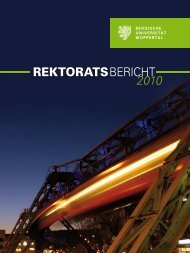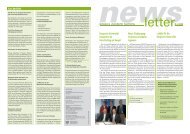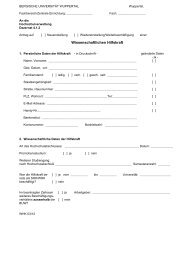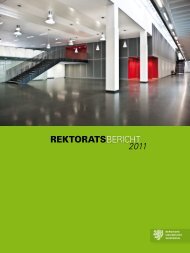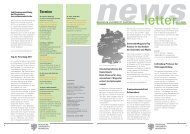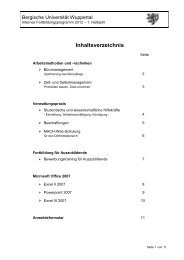international - Bergische Universität Wuppertal
international - Bergische Universität Wuppertal
international - Bergische Universität Wuppertal
You also want an ePaper? Increase the reach of your titles
YUMPU automatically turns print PDFs into web optimized ePapers that Google loves.
54<br />
improving energy effiCienCy<br />
on ConstrUCtion sites<br />
With around 705,000<br />
employees and an investment<br />
of some €212 billion<br />
in 2009, Germany’s construction<br />
industry plays a major<br />
role in the nation’s economy.<br />
Its carbon footprint and use<br />
of resources are correspondingly<br />
high. But choice of<br />
building materials and energy<br />
consumption are both closely<br />
linked to costs. Paradoxically,<br />
the care taken nowadays in<br />
designing environmentally<br />
sustainable, energy-efficient<br />
buildings is not reflected in<br />
the construction process itself,<br />
which is often marked<br />
by a casual attitude to energy<br />
resources, ranging from<br />
faulty logistics involving extra<br />
journeys, through old, ener-<br />
gy-inefficient machinery, to<br />
construction site lighting that<br />
is left on all night. Management<br />
and employees seem<br />
not to think of reducing fuel<br />
consumption or emissions<br />
(and their associated costs),<br />
although environmentally appropriate<br />
behavior could produce<br />
enormous savings for<br />
their companies.<br />
UW’s Interdisciplinary Center<br />
for Technical Process Management<br />
is currently engaged<br />
on a research project for<br />
the German Environmental<br />
Foundation to develop concepts<br />
tailored to the construction<br />
industry for the enhancement<br />
of energy efficiency<br />
on building sites. Titled “The<br />
Development of Concepts for<br />
the Enhancement of Energy<br />
Efficiency and the Reduction<br />
of Co Emissions on Cons-<br />
2<br />
truction Sites”, the project<br />
aims to investigate the plant,<br />
methods, and processes used<br />
in the industry from the point<br />
of view of energy consumption<br />
and carbon footprint, and<br />
to pinpoint organizational,<br />
technical, and HR-centered<br />
potentials for improvement<br />
and optimization. When the<br />
project is completed, construction<br />
companies will be provided<br />
with clear economic as<br />
well as ecological incentives<br />
to save natural resources and<br />
reduce carbon emissions.<br />
orGAniZAtionAL<br />
eFFiCienCy<br />
Good organization in both the<br />
preparatory and construction<br />
phase is the basis of efficient<br />
site management. Shortcomings<br />
tend to appear in<br />
the realization rather than the<br />
making of plans: for example,<br />
machinery of the right sort is<br />
not available in the right quantities,<br />
or materials and equipment<br />
are left behind at the<br />
site, causing additional journeys<br />
with extra fuel costs and<br />
wages. A particularly weak<br />
spot from the ecological point<br />
of view is unnecessary distances<br />
between suppliers (e.g.<br />
of prefabricated elements)<br />
and the construction site.<br />
teCHniCAL uPGrAdinG<br />
Technical improvements can<br />
often be made by selecting appropriate<br />
construction plant in<br />
appropriate quantities. Manufacturers<br />
of modern machinery<br />
are well aware of the im-<br />
portance of efficiency and the<br />
reduction of both fuel consumption<br />
and emissions: fuel<br />
savings of up to 50% and Co2 reductions of several million<br />
tons a year are considered<br />
realistic in terms of currently<br />
available technologies. What<br />
is lacking is acceptance of<br />
these by the market. A specific<br />
problem is the difficulty of<br />
comparing construction machinery<br />
performances, due<br />
on the one hand to incomplete<br />
information from manufacturers,<br />
and on the other to the<br />
lack of a generally accepted<br />
standard for determining the<br />
fuel consumption of construction<br />
plant. It is up to the<br />
relevant organizations and authorities<br />
to change this state<br />
of affairs.<br />
tAPPinG enerGy-<br />
sAVinG PotentiALs<br />
Informing and motivating con-<br />
struction workers across the<br />
entire spectrum of building site<br />
trades and professions is a<br />
major factor in lifting the ecological<br />
profile. However efficient<br />
a machine, the influence<br />
of the operator on fuel consumption<br />
and productivity increases<br />
with every new generation<br />
of equipment.<br />
A cross-European survey<br />
conducted by UW’s Center<br />
for Technical Process Management<br />
reveals a significant<br />
deficit in the awareness<br />
and exploitation of energy<br />
saving potentials in the construction<br />
industry. Although<br />
83% of respondents assumed<br />
that environmental and<br />
climatic factors would play an<br />
increasing role in future projects<br />
and commissions, this<br />
awareness was not reflected<br />
in knowledge of energy<br />
efficiency and Co emission<br />
2<br />
potentials on the building site.<br />
Approximately one third<br />
of those questioned could<br />
say nothing about the level of<br />
their energy costs at all.<br />
Interdisciplinary Center for<br />
Technical Process Management<br />
Pauluskirchstr. 9<br />
42285 <strong>Wuppertal</strong><br />
Univ.-Prof. Dr.-Ing. Manfred<br />
Helmus<br />
Dipl.-Ing. Selcuk Nisancioglu<br />
Dipl.-Ing.(FH) Anne<br />
Christine Randel<br />
T: +49 (0)202 439-4191<br />
E: s.nisancioglu@<br />
uni-wuppertal.de<br />
kwww.iz3.uni-wuppertal.de<br />
03_UW_RESEARCH<br />
55




